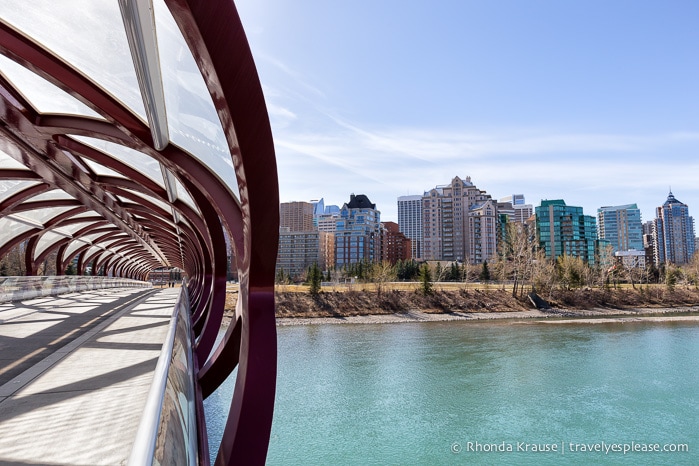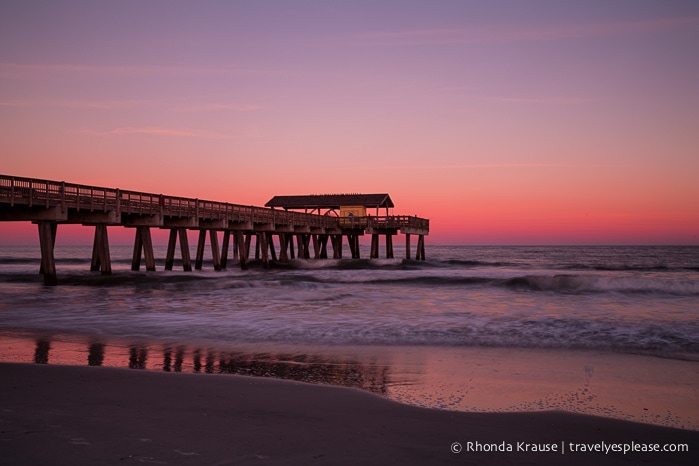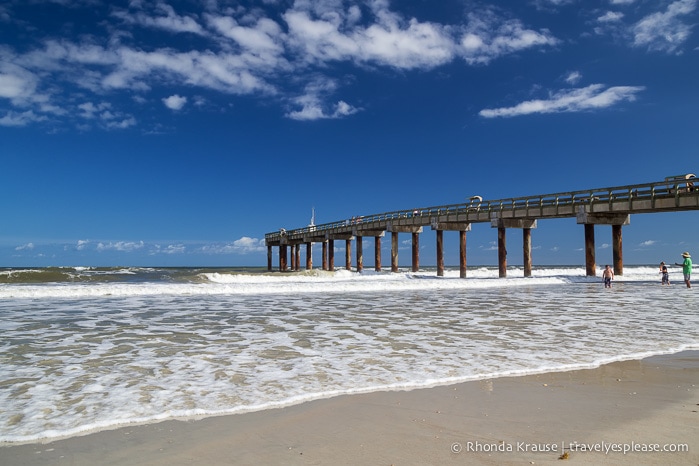Travel Reviews- Which to Trust, Which to Ignore?
Purchases made through links earn us a small commission, at no extra cost to you.
Going a trip can be a big expense. For the majority of us, a vacation is a major purchase and like any other major purchase, decisions should be made carefully.

This often means people scour the internet for travel reviews and suggestions. A lot of people even ask their friends and family for advice. It’s normal to want to know what other people thought of a destination before you cash in your precious vacation days and spend a couple thousand dollars to go there.
But, can everything you read be trusted? Should you believe everything people tell you?
My answer is no.
I say no because by nature, travel is a subjective, uniquely individual experience. No two people will walk away from a destination with the exact same thoughts and feelings. Even my husband and I sometimes have drastically different impressions of a place, and we’re on the same trip!
Now, I’m not saying don’t bother reading travel reviews and asking for advice, because I do it too. Blogs, review sites, and Facebook groups can be great places to get a little introduction to a destination. People will be quick to suggest sites to see, things to do, places to stay etc. They also will be just as quick (if not quicker) to tell you where not to go, what not to eat, which hotels to avoid.
You may be thinking, but isn’t all that information helpful?
Yes, it can be helpful. It can also be misleading. Especially if you’re not taking everything you read with a grain of salt.
Which Travel Reviews to Trust?
So, how can you distinguish the trustworthy travel reviews from the untrustworthy ones? Which advice should you take to heart and which should you ignore? Here are a few things we keep in mind when consulting others for travel advice.

Advice from Friends, Family & Acquaintances
1. How well do we know the person?
If we are asking for advice from a close friend who has proven to be trustworthy and level-headed in the past, then we’re more likely to believe their advice. If we’re talking to an acquaintance, or a friend-of-a-friend, we’re more cautious when considering what they’re telling us, just because we don’t know them and their travel style/preferences.
2. How similar is their travel style to ours? Do they like the same things as we do?
This one is so important consider. For example, a friend who loves staying at luxury resorts may not have good things to say about a multi-day hiking/camping trip. The trip could have been well-organized, the guides informative, the food great, the sights spectacular, but if that person just wanted to relax at the spa, they may not have good things to say about the trip just because it clashes with their personal preference.
I tend not to put a lot of weight into the suggestions I get from friends who like to spend their time shopping or partying because those are things I don’t like to do. However, I will be more likely to trust a friend who likes architecture, archaeology, culture and active vacations, because those are my interests also.
3. Have they been there, done that?
There is no sense considering someone’s opinion on a place if they’ve never been there. This applies to activities too. Why would I take advice on a potential ski vacation from someone who doesn’t even ski?
4. How much of the destination did they see/experience? How much time did they spend there?
When listening to travel advice and opinions, I always consider how extensively that person traveled in the destination. Did they only visit one city yet talk about their experience as if it applies to the whole country? Did they spend a month in that country or only a few days? Someone who spent a short time in a place can still have valuable advice, but someone who has spent a longer time there is likely to have more in-depth tips.
I especially watch out for comments concerning resort destinations, like Mexico or Cuba. If that person visited Cuba, but never set foot off the resort, then I’m not going to seriously consider their opinion on the country as a whole.
Advice from the Internet- Blogs, Reviews Sites, Travel Forums etc.
1. Is the review vague or specific?
The more specific the review the more trustworthy it probably is. If someone just says, “I would never go back to ___________” or “Don’t waste your money”, I’m left wondering why. Did something unfortunate happen to make this person say that, or do they just have a bad attitude in general?
On the contrary, if someone says “Don’t stay at this hotel. The carpet was filthy, there were bedbugs and they charged my credit card twice,” I now know the reasons for their opinion and can make a more informed decision.
As a rule, we look for and trust reviews that refer to specific aspects of that person’s stay, verses those that talk in generalities.

2. Are the reviews verified?
Some hotel booking sites only allow people to write a review if they are a verified customer who has completed their stay. This is one reason why Booking.com is our trusted accommodation site (the only one we use)- all the reviews were written by real guests. Once your complete your stay, you get sent a link to rate and comment on your experience. Another site that posts only verified reviews is Expedia.
In contrast, some sites allow anybody to rate a business and share a review. The reviewer may or may not have not actually been a patron. It could be written by a competitor, for example, or even the business’ own staff members. Trip Advisor is one site that has been known to have fake reviews. They do try to detect fraud and ask reviewers to check a box certifying that “this review is based on my own experience and is my genuine opinion…”. But let’s be real, if you’re setting out to write a fake review, I’m pretty sure that check box is not going to scare you away.
3. What is the date of the review?
The most recent reviews usually give a current picture of the place, especially where hotels are concerned. I tend to disregard hotel reviews that are more than a year old, because a lot could have changed in that time.
Destinations are slower to change and someone’s advice could still be relevant years later. However, I am more likely to trust someone who just returned from a trip to a certain destination than someone who visited ten years ago.

4. Is the review a broad generalization?
An important thing to look for is generalizations. Did the person have a bad experience in one city yet they are throwing the whole country under the bus? Did the person encounter a few unfriendly locals but are generalizing all people of that nationality as rude?
It’s important to remember that countries, even cities can vary drastically according to region/neighbourhood. A good review will take this into consideration.
5. Is the review one-sided or well balanced? Are the complaints relevant?
If the review is 100% positive or 100% negative, there could be more to the story. This is especially important when it comes to sites like Trip Advisor and travel blogs.
I get suspicious if a review is over-the-top, glowing about how wonderful and great everything is. Maybe the person writing it works for the company/place being reviewed. Maybe they were paid to say all that or given something in exchange for a positive review. It could also be the case that the reviewer just doesn’t like to say anything negative.
I also ignore travel reviews that are completely negative because I think there is always something redeeming about a place, even if you have to dig deep to find it. When I read reviews that are 100% negative, I tend to think that maybe this person is unusually picky, or can’t be pleased no matter what. There are people like that!
It’s also important to assess the relevancy of what the reviewer’s complaints are. I once read a review where someone was outraged that the cab drivers in a foreign country didn’t speak English!
A guideline I tend to follow is to ignore the very highest reviews and the very lowest reviews and focus on the middle ground- the group’s average opinion/rating. A review that is balanced and presents both the positive aspects and areas for improvement are usually the most trustworthy. My favourite bloggers are very good at presenting both the things they liked and didn’t like about a destination.

6. How many people are saying the same thing?
If almost everyone is saying that a certain place is great to visit, then it most likely is. If the majority of people are talking about how terrible a place is, that is a red flag.
7. Is the article sponsored?
This one mostly applies to blogs and is increasingly becoming something to be aware of. A lot of articles on blogs nowadays are nothing more than advertisements paid for by PR companies.
Sometimes a blogger discloses these posts as sponsored, sometimes they don’t. Sometimes they are even asked by the PR company not to label the post as sponsored, which brings ethics into questions.
Sponsored posts are not useless, in that they can still give an overview of a destination. For me though, if the blogger is not speaking from personal experience, if they haven’t visited the destination firsthand, then I won’t consider the piece to be a credible recommendation.
8. Was the author given something in exchange for a review/content on their site?
It’s important to note whether a blogger was given a product or service for free in exchange for a post on their site (and whether or not this was disclosed).
Some people have no problem being unbiased and telling the truth, both good and bad, about a complimentary activity. Other people find this difficult, feeling that if it was given to them for free they should only say good things.
I don’t read, never mind trust, hotel “reviews” written by bloggers who got a free stay in exchange for writing an article. For one, most are not reviews at all but more of a promotion piece. You can tell by the flowery, glowing language used, especially how often the word “best” appears in the article. Ex:”____ hotel is the BEST place to stay in ____ “, even though the writer only stayed in one hotel in that city and has nothing else to compare it to. It doesn’t come across as genuine or honest and sounds like the author is kissing up to get something they want. Oh, wait- that’s exactly it!
If the writer’s main purpose of the article is to provide promotion/exposure rather than sharing their unbiased experience with the intent of helping other travellers, then I see no value to the “review”. Be aware that their loyalty likely lies with the company they struck a deal with and not you as a reader.
9. Is there potential for the author to profit from a good review?
I worry about this one when I’m reading reviews about camera equipment. Often the review will have affiliate links to the products being discussed. Obviously, the potential to make sales is greater if you’re saying the product is wonderful.
I’m not saying a review or article with affiliate links can’t be trusted, you just really need to consider the authority and reputation of author and look to see if the article presents a balanced view.

You’ve Narrowed it Down to the Good Advice- Now What?
After all that research, you still have to make a decision whether to book that trip or not.
While you should definitely take into account the suggestions and advice from your reliable sources, the final decision is yours and should ultimately be based on your preferences, desires and dreams.
Don’t base your decisions 100% on what you read or hear. And remember, there are no guarantees.

On our blog, when you read about how we experienced a place, that could be very different from how you experience it. I’ve read blogs that rave about certain places and then I get there and don’t have a good time. I’ve also read about places that people didn’t like at all, but I really enjoyed. It all comes down to personal preference.
The bottom line is, if you’ve been dreaming about going somewhere then you should go. Try not to let anyone change your travel dreams. You’ve done your research, got some helpful tips, know a little about what to expect. You’re prepared. Now go there with an open mind and have some fun!








